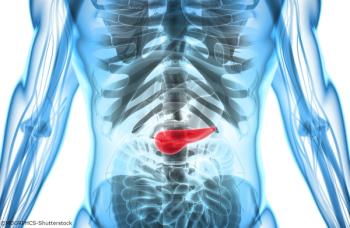
Pancreatic Cancer
Latest News
Latest Videos

More News

Medical use of AI increases every day, and in the future, will be exponentially greater and many forms of treatment will be improved, according to Russell C. Langan, MD, FACS, FSSO.

Shubham Pant, MD, MBBS, highlights an “exciting time” in the treatment of patients with RAS-mutated pancreatic cancer.

A computational linguistics model designed to locate pancreatic cysts that started to locate pancreatic cancer has the potential to lead to more efficient treatment.

Bridging Racial and Ethnic Minority Disparities in Pancreatic Cyst Surveillance
A computational linguistics model has mitigated disparities in surveillance of the pancreas that primarily affected racial and ethnic minorities.

Tanios S. Bekaii-Saab, MD, provides an overview of current therapy options and ongoing initiatives involving targetable alterations in those with pancreatic cancer.

The incorporation of palliative care specific to mental health services and therapy remains underutilized in the care of patients with pancreatic cancer.

A nurse practitioner gives a closer look into the risk factors, diagnosis, adverse effects, and future treatments associated with pancreatic cancer.

The 18-month overall survival rate with the mitazalimab combination in OPTIMIZE-1 exceeds a historical rate achieved with FOLFIRINOX alone.

The updated Prescription Drug User Fee Act date for zenocutuzumab in these indications is February 4, 2025.

Study data show that no patient with a response required opioids after a 24-hour post-procedure follow-up.

Results from the CANFOUR trial of combining nadunolimab with chemotherapy appear to prolong overall survival among those with advanced or metastatic PDAC.

Regardless of type 2 diabetes status, pancreatic cancer risk was reduced with metabolic-bariatric surgery for patients who were obese.

Experts in gastrointestinal cancer focus on frontline therapy options for patients with pancreatic cancer.

Data from the interim analysis of the ACCENT trial showed promising signs of efficacy with narmafotinib combination therapy in advanced pancreatic cancer.

Research shows that patients with pancreatic ductal adenocarcinoma are frequently understaged prior to surgery.

Adding metastasis-free directed radiation to chemotherapy more than tripled progression-free survival vs chemotherapy alone in the EXTEND trial.

FDA acceptance is based on phase 3 CABINET trial results, with cabozantinib showing a PFS improvement in patients with pancreatic neuroendocrine tumors.

Experts from Vanderbilt Medical Center review mechanisms, supporting data, and patient cases associated with the use of IORT in pancreatic cancer.

The overall survival benefit seen with DOC1021 in a phase 1 trial of glioblastoma support the fast track status decision for the agent.


Investigators are assessing the use of IORT in patients with borderline resectable or unresectable pancreatic cancer as part of the phase 2 PACER trial.

Kamran Idrees, MD, MSCI, MMHC, FACS, discusses how factors such as vessel involvement can influence the decision to proceed with surgical therapy.

Milad Baradaran, PhD, DABR, outlines the design of Mobetron as an option for administering intraoperative radiation therapy in pancreatic cancer care.

More than half of the patients who received mitazalimab plus chemotherapy experienced an unconfirmed objective response in the phase 2 OPTIMIZE-1 study.

Longer survival rates were experienced by patients receiving chemotherapy both before and after surgery vs only after surgery.


















































